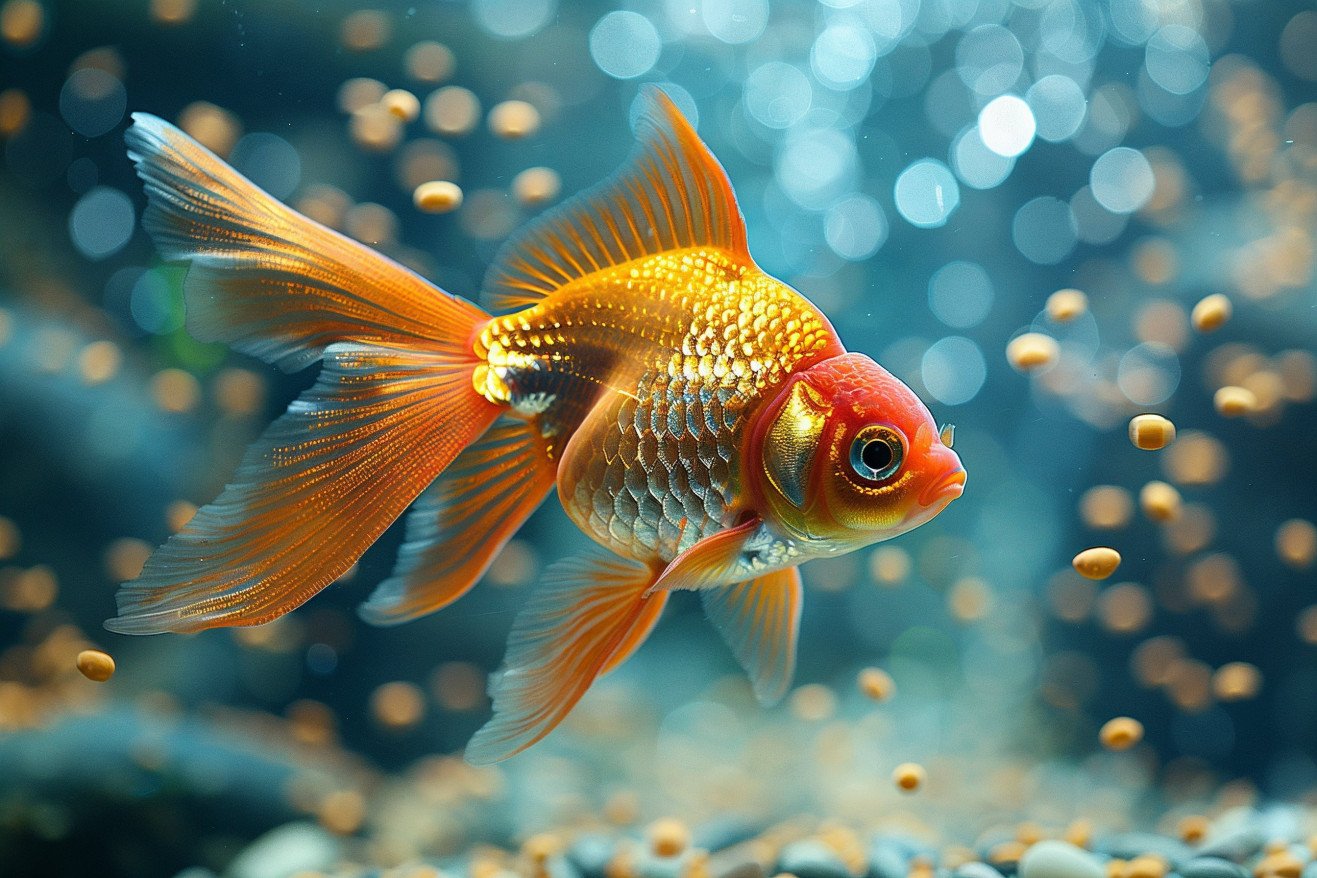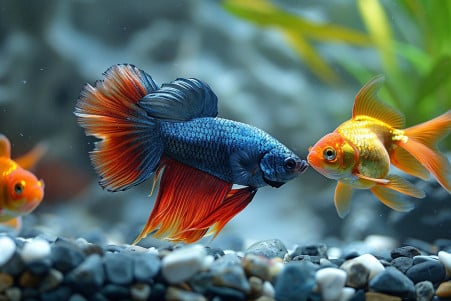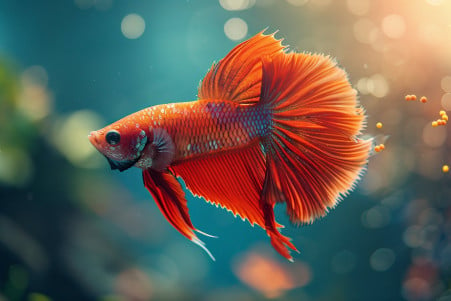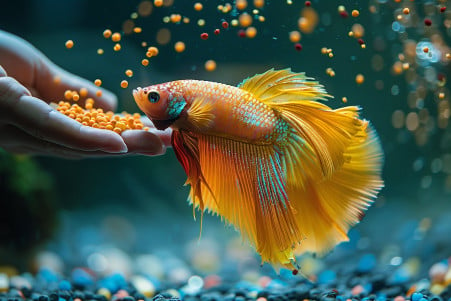Can Goldfish Eat Betta Food? Nutritional Needs Explored
14 March 2024 • Updated 13 March 2024

Goldfish and bettas may share the same tank, but can they also share the same food? While goldfish can eat betta food on occasion, it can’t be a regular part of their diet. This is because betta food is high in protein, which goldfish need in small amounts, and low in the carbohydrates and plant matter that goldfish need to be healthy.
In this deep dive into the nutritional questions of the fish world, we’ll look at a wealth of ichthyological research and nutritional data. We’ll also look at veterinary science, comparative nutrition, and pet care recommendations to explain the differences between goldfish and betta diets.
Our hope is to give you a full understanding of how these differences impact the ability to share food between the two species so that you can keep your fish healthy and happy for years to come.
Can goldfish eat betta food?
What Do Goldfish Eat? A Look at Nutritional Requirements
Knowing what to feed goldfish is essential to keeping them healthy and happy. Goldfish need a mix of protein, carbohydrates, and plant-based foods in their diet.
Since goldfish are omnivores, they need a mix of dry foods like flakes and pellets and live foods like brine shrimp and earthworms, as well as the occasional treat like soft vegetables to get all the nutrients they need.
However, as Christina Crowe, the author of Goldfish Food and Feeding: The Ultimate Guide, points out, it’s important to make sure that you don’t overfeed goldfish, as they are always ready to eat and will eat until they’re sick, which can lead to stress and excess ammonia in the tank.
Goldfish metabolism is also affected by water temperature. As the temperature of the water drops, so does the goldfish’s metabolism, which means that the amount and type of food they eat should change as well.
Mike Robinson, the author of Koi & Goldfish Nutrition, suggests that goldfish should be fed a staple diet that contains protein levels of 30–35%, and that when the water temperature drops, they should be fed a wheatgerm diet, which is more easily digestible.
Goldfish should be fed in a way that ensures that each fish is able to eat in a 5–6 minute period, which is important because goldfish don’t have a true stomach and can’t store food. If they eat too much, they can develop digestive problems.
If goldfish aren’t fed according to these guidelines, they can develop nutritional deficiencies, which brings up the question of how betta food is formulated and how that might affect goldfish.
Knowing the Nutritional Composition of Betta Food
Betta food is formulated to meet the specific nutritional needs of bettas. For example, Ocean Nutrition’s premium floating pellets are formulated to provide a high-quality, color-enhancing diet. They are also non-clouding and float, which is ideal for bettas that feed from the water’s surface.
Meanwhile, Seachem’s NutriDiet Betta Flakes are made with the best ingredients, including Chlorella algae and fish meal, and no fillers. They also contain probiotics to aid in nutrient uptake and support the fish’s immune system.
On the other hand, goldfish need a lower protein diet that’s more balanced with plant and grain-based foods. As a result, betta food is higher in protein and may contain color enhancers and probiotics that aren’t necessary for goldfish. For instance, API’s BETTA FOOD is formulated with protein that’s been optimized for maximum absorption, which could lead to higher ammonia excretion in goldfish, a species that doesn’t need as much protein.
In addition, the color enhancers in betta food are designed to bring out the fish’s natural colors, which is not a priority when it comes to goldfish food.
As a result, the high protein content and the other additives that are specific to bettas could be hard on goldfish’s digestive systems, leading to potential health problems. As a result, while betta food is formulated to meet the specific needs of bettas, it could be harmful to goldfish if ingested.
Potential Health Concerns of Feeding Goldfish Betta Food
Feeding goldfish betta food can lead to a variety of health problems. The PetMD Editorial Team notes that every species of fish requires a diet that meets its specific nutritional needs, and one of the potential risks of feeding fish food that isn’t species-appropriate is the development of nutritional diseases.
Meanwhile, The Goldfish Tank points out that goldfish don’t have a true stomach and instead rely on their intestines to digest and absorb nutrients. As a result, high-protein betta food can move too quickly through the goldfish’s short digestive tract, which can lead to the overproduction of waste and the health problems that come with it.
If goldfish are fed betta food on a regular basis, they may develop a number of nutritional deficiencies. The Spruce Pets explains that one of the potential risks of feeding adult goldfish high-protein foods is that it can lead to protein-induced growth stunting and waste buildup in the tank, so it’s important to make sure that the protein content of the food is below the 30% maintenance level.
Meanwhile, vitamin deficiencies that result from the inability of goldfish to meet their nutritional needs on a high-protein diet can lead to a variety of health problems, including skeletal deformities and issues with the nervous system. These deficiencies highlight the importance of feeding goldfish a diet that’s appropriate for their species in order to prevent health problems and help them live long, healthy lives.
How to Create a Balanced Diet for Your Goldfish
When creating a diet for a goldfish, it’s important to make sure that you’re giving them a variety of foods. Pet Keen recommends starting with a high-quality goldfish pellet or flake as the base of the diet and then adding freeze-dried or fresh vegetables for fiber and live foods like brine shrimp or bloodworms for protein. This will match their natural diet and help keep their digestive system healthy.
While it’s OK to use betta food as a treat for goldfish, it’s important to make sure that you’re not giving them too much and throwing their diet off balance. If you’ve been using betta food, you’ll want to slowly start to reintroduce goldfish food into their diet. You can do this by mixing goldfish pellets with betta food and then slowly increasing the amount of pellets in the mix.
While goldfish can eat some human foods, like peas, you should only give them these foods occasionally so that you don’t throw off their diet. It’s also important to make sure that you’re always feeding them food that’s specifically designed for goldfish, which will have the right balance of carbohydrates and protein that they need.
This will help ensure that your fish stay healthy. By doing this, you can make sure that your fish are getting a diet that’s both healthy and safe and that will help them live a long, healthy life.
Final Thoughts: How to Keep Your Goldfish Healthy with the Right Diet
In the world of fish keeping, the question of whether goldfish can eat betta food has led to a lot of confusion and concern. However, as we’ve seen, the bottom line is pretty simple: goldfish are omnivores with specific dietary needs that are best met by a well-rounded diet that is very different from the high-protein diet that bettas require.
While the occasional snack of betta food is probably fine, feeding goldfish betta food on a regular basis can lead to digestive problems and nutritional imbalances.
It’s important to remember the importance of feeding fish a diet that’s tailored to their specific needs. As one study notes, it’s important to make sure that goldfish are getting the right mix of proteins, carbohydrates, and plant matter in their diet to ensure that they are healthy and thriving, not just because it’s what they’re used to.
This is backed up by The Goldfish Tank, which says that goldfish food should be the staple of their diet.
As fish owners, it’s our responsibility to make sure that we’re making the best and most informed decisions about the food we feed our pets. This means that we need to understand and honor the specific dietary needs of goldfish, which will ensure that we’re not just feeding them, but that we’re also supporting their health and well-being and helping them live their best lives in our care.
This is a key part of being a responsible pet owner and shows our commitment to the animals that bring so much joy into our lives.


